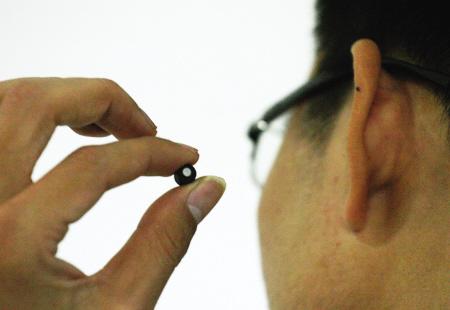Hi-tech items, such as neatly disguised wireless transmitters, are becoming a headache for China's exam proctors as exam sitters look for new ways to cheat on highly competitive national exams.
|

|
|
This type of mini-earphone is found in many cheating cases in national exams. [File photo]
|
The Beijing Radio Administration Bureau detected 16 cases of unidentified signals, indicating cheating in this year's national exam for graduate study. Roughly 1.25 million sat the exam from Saturday to Monday,
The bureau caught two cheaters at site on Saturday. They were deprived of the right to continue the exam and were turned in to the local police for further questioning.
Zhu Li, a director for the bureau, told Xinhua Wednesday that cheaters of this type normally use earphones the size of a soybean and a neatly hidden wireless transmitter to get the answers from a hired "Qiangshou" -- someone who provides answers to test questions from outside the exam room.
These Qiangshou are known for their academic prowess.
While Qiangshou are able to transmit answers to test takers, it is unclear how they obtain the exam questions in the first place, Zhu said.
"Technically, they could have someone in the exam room scan the papers and send the pictures through wireless transmitters," Zhu said, "but, it's almost impossible in reality as it would need very strong signals."
The bureau also caught two hi-tech cheaters in the latest national civil servant exam on Nov. 30, 2008.
In China's highly competitive national exams, where chances of success are very slim, many applicants, especially the less academically inclined, are lured to cheat.
Statistics from sohu.com, a popular Web portal, show about one third of the exam applicants last year were successfully enrolled to pursue graduate study. However, hot universities and majors usually see an enrollment rate of less than 10 percent.
More than 770,000 people took part in the civil service exam, the success rate for which is less than two percent. More than 4,500 applicants competed for the most popular post.
The Beijing Municipal Bureau of Personnel said early December that major exam sites in Beijing were covered by wireless signal interrupters that could locate and cut off unidentified signals.
"We are trying our best to act faster when abnormal signals are detected and we will increase the number of signal detectors in the near future," Zhu said.